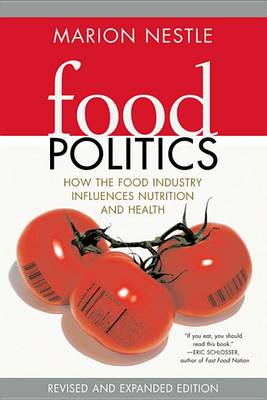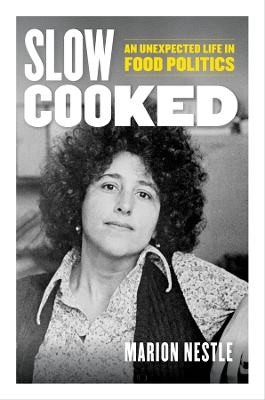California Studies in Food and Culture
4 primary works
Book 3
We all witness, in advertising and on supermarket shelves, the fierce competition for our food dollars. In this engrossing expose, Marion Nestle goes behind the scenes to reveal how the competition really works and how it affects our health. The abundance of food in the United States - enough calories to meet the needs of every man, woman, and child twice over - has a downside. Our over-efficient food industry must do everything possible to persuade people to eat more - more food, more often, and in larger portions - no matter what it does to waistlines or well-being. Like manufacturing cigarettes or building weapons, making food is big business. Food companies in 2000 generated nearly $900 billion in sales. They have stakeholders to please, shareholders to satisfy, and government regulations to deal with. It is nevertheless shocking to learn precisely how food companies lobby officials, co-opt experts, and expand sales by marketing to children, members of minority groups, and people in developing countries. We learn that the food industry plays politics as well as or better than other industries, not least because so much of its activity takes place outside the public view.
Editor of the 1988 "Surgeon General's Report on Nutrition and Health", Nestle is uniquely qualified to lead us through the maze of food industry interests and influences. She vividly illustrates food politics in action: watered-down government dietary advice, schools pushing soft drinks, diet supplements promoted as if they were First Amendment rights. When it comes to the mass production and consumption of food, strategic decisions are driven by economics - not science, not common sense, and certainly not health. No wonder most of us are thoroughly confused about what to eat to stay healthy. An accessible and balanced account, "Food Politics" will forever change the way we respond to food industry marketing practices. By explaining how much the food industry influences government nutrition policies and how cleverly it links its interests to those of nutrition experts, this path-breaking book helps us understand more clearly than ever before what we eat and why.
Editor of the 1988 "Surgeon General's Report on Nutrition and Health", Nestle is uniquely qualified to lead us through the maze of food industry interests and influences. She vividly illustrates food politics in action: watered-down government dietary advice, schools pushing soft drinks, diet supplements promoted as if they were First Amendment rights. When it comes to the mass production and consumption of food, strategic decisions are driven by economics - not science, not common sense, and certainly not health. No wonder most of us are thoroughly confused about what to eat to stay healthy. An accessible and balanced account, "Food Politics" will forever change the way we respond to food industry marketing practices. By explaining how much the food industry influences government nutrition policies and how cleverly it links its interests to those of nutrition experts, this path-breaking book helps us understand more clearly than ever before what we eat and why.
Book 5
Food safety is a matter of intense public concern, and for good reason. Millions of annual cases of food 'poisonings' raise alarm not only about the food served in restaurants and fast-food outlets but also about foods bought in supermarkets. The introduction of genetically modified foods - immediately dubbed 'Frankenfoods' - only adds to the general sense of unease. Finally, the events of September 11, 2001, heightened fears by exposing the vulnerability of food and water supplies to attacks by bioterrorists. How concerned should we be about such problems? Who is responsible for preventing them? Who benefits from ignoring them? Who decides? Marion Nestle, author of the critically acclaimed "Food Politics", argues that ensuring safe food involves more than washing hands or cooking food to higher temperatures. It involves politics. When it comes to food safety, billions of dollars are at stake, and industry, government, and consumers collide over issues of values, economics, and political power - and not always in the public interest. Although the debates may appear to be about science, Nestle maintains that they really are about control: who decides when a food is safe?
She demonstrates how powerful food industries oppose safety regulations, deny accountability, and blame consumers when something goes wrong, and how century-old laws for ensuring food safety no longer protect our food supply. Accessible, informed, and even-handed, "Safe Food" is for anyone who cares how food is produced and wants to know more about the real issues underlying today's headlines.
She demonstrates how powerful food industries oppose safety regulations, deny accountability, and blame consumers when something goes wrong, and how century-old laws for ensuring food safety no longer protect our food supply. Accessible, informed, and even-handed, "Safe Food" is for anyone who cares how food is produced and wants to know more about the real issues underlying today's headlines.
Book 33
Calories - too few or too many - are the source of health problems affecting billions of people in today's globalized world. Although calories are essential to human health and survival, they cannot be seen, smelled, or tasted. They are also hard to understand. In "Why Calories Count", Marion Nestle and Malden Nesheim explain in clear and accessible language what calories are and how they work, both biologically and politically. As they take readers through the issues that are fundamental to our understanding of diet and food, weight gain, loss, and obesity, Nestle and Nesheim sort through a great deal of the misinformation put forth by food manufacturers and diet program promoters. They elucidate the political stakes and show how federal and corporate policies have come together to create an "eat more" environment. Finally, having armed readers with the necessary information to interpret food labels, evaluate diet claims, and understand evidence as presented in popular media, the authors offer some candid advice: Get organized. Eat less. Eat better. Move more. Get political.
Book 78
Marion Nestle reflects on her late-in-life career as a world-renowned food politics expert, public health advocate, and a founder of the field of food studies after facing decades of low expectations.
In this engrossing memoir, Marion Nestle reflects on how she achieved late-in-life success as a leading advocate for healthier and more sustainable diets. Slow Cooked recounts of how she built an unparalleled career at a time when few women worked in the sciences, and how she came to recognize and reveal the enormous influence of the food industry on our dietary choices.
By the time Nestle obtained her doctorate in molecular biology, she had been married since the age of nineteen, dropped out of college, worked as a lab technician, divorced, and become a stay-at-home mom with two children. That's when she got started. Slow Cooked charts her astonishing rise from bench scientist to the pinnacles of academia, as she overcame the barriers and biases facing women of her generation and found her life's purpose after age fifty. Slow Cooked tells her personal story—one that is deeply relevant to everyone who eats, and anyone who thinks it's too late to follow a passion.
In this engrossing memoir, Marion Nestle reflects on how she achieved late-in-life success as a leading advocate for healthier and more sustainable diets. Slow Cooked recounts of how she built an unparalleled career at a time when few women worked in the sciences, and how she came to recognize and reveal the enormous influence of the food industry on our dietary choices.
By the time Nestle obtained her doctorate in molecular biology, she had been married since the age of nineteen, dropped out of college, worked as a lab technician, divorced, and become a stay-at-home mom with two children. That's when she got started. Slow Cooked charts her astonishing rise from bench scientist to the pinnacles of academia, as she overcame the barriers and biases facing women of her generation and found her life's purpose after age fifty. Slow Cooked tells her personal story—one that is deeply relevant to everyone who eats, and anyone who thinks it's too late to follow a passion.


